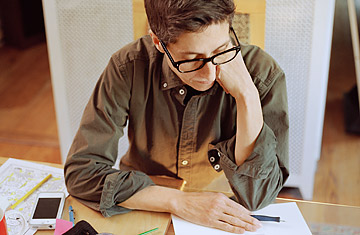
It's complicated. The best-selling author, at the University if Chicago for a residential fellowship, draws a picture of her mother.
(2 of 2)
Bechdel spends most of her time, meaningless or otherwise, near Burlington, Vt. She grew up in rural Pennsylvania, where her parents taught high school English and had literary aspirations; they met in a college production of The Taming of the Shrew. They were stiff and not conventionally affectionate parents, but they did provide a highly cultured environment for their children, which accounts both for Bechdel's literary fluency and, in a funny, inverted way, her unconventional choice of comics as a medium. "I abandoned writing early," she says, "because I felt like my mother was the writer. I felt like I could never do that — never be good enough. Cartooning was a way to express myself without anyone seeing me or judging me."
So while Bechdel's prose shows the imprint of Fitzgerald and Joyce and Proust, her roots as an artist lie with Addams and Richie Rich, Donald Duck and Edward Gorey. "And I was a Mad magazine addict," she says. "That was a huge influence." Bechdel has an almost unfairly brilliant double gift as both a writer and an artist. It's one of the hallmarks of her books that the art and the words are equally load bearing. They play in unison, or harmonize, or pursue complementary themes. The text might be telling the story of the minotaur and the labyrinth, while the art shows her as a child, being chased through her labyrinthine home by her monstrously angry father. It's an effect unique to comics — you couldn't get it in any other medium.
In some respects, Are You My Mother? is about Bechdel's own work and the buried tensions between her and her mother that it brought to light. Bechdel has lived out the life that her father, as a closeted pre-Stonewall homosexual, never could; in the same way, she is living the independent, artistic life that was denied her mother by the straitjacketed gender politics of the 1950s. "I regret that I wasn't Helen Vendler," she tells her daughter in Are You My Mother?, referring to the well-known poetry scholar. "I could have done that."
Her mother's ambivalence toward her is palpable on every page: she loves her daughter and wants her to be free, but it's agony for her to watch another person enjoy the gifts she never received. Bechdel internalized this ambivalence very young, and it has haunted her ever since. "I can't write this book until I get her out of my head," Bechdel tells her therapist in Are You My Mother?, "but the only way to get her out of my head is by writing the book!" She enlists to her cause writers and theorists of art and feminism like Virginia Woolf and Adrienne Rich, as well as the pioneering psychoanalyst Donald Winnicott, who described how a mother's love gives her child a sense of self — and what happens when Mom withholds that love.
Are You My Mother? is a tremendously intimate work, more so even than Fun Home. Taken together, the two books are a practical guide to the complicated, unspoken negotiations that take place between children and their parents, those sphinxlike beings who give us life and then promptly deal us near fatal psychic wounds.
Watching Bechdel dig into the underworld of her subconscious is paradoxically uplifting. The courage and rigor with which she examines her life make readers feel as if their own secrets might not be quite so unspeakable. "I feel more anxious having this book out in the world than I did with the book about my dad," she says. "I don't really know what possessed me! I suppose it's confessional, in the sense of the sacrament. I'm hoping for some kind of absolution." Whether or not she receives it herself, she has given it to her readers.
